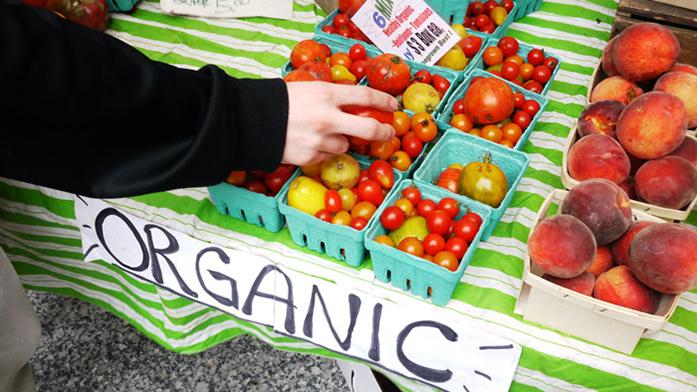Iowa is famous for farms, and now the Hawkeye State is gaining recognition as a leader in organic farming as well.
Organic farmers from around Iowa — the state with the fifth-largest number of organic farms in the country, according to the Iowa Organic Association — will meet at the University of Iowa for a conference on organic farming next week. The UI and Iowa State University will co-host the 15th-annual Iowa Organic Conference in the IMU on Nov. 22 and 23.
Farmers, food vendors, and anyone who is interested may attend the event to collaborate on organic farming methods, network with buyers and sellers, and eat organic food.
“It’s about networking, education, and learning about trends in the organic industry,” said George McCrory, a UI Office of Sustainability communications specialist.
On the evening of Nov. 22, there will be a local foods expo, new to the conference this year. McCrory said the expo is an opportunity for local food producers to meet with businesses that could potentially buy their products.
The meals at the conference will be entirely organic. UI banquet and catering chef Anne Watson planned, organized, and will prepare the meals, which are made with foods donated by local businesses and producers.
“It’s fun, because we can create what we want to serve based on the donations that we’ve received,” Watson said. “For example, this year we’re using watermelon, which was donated in August. We take it in and freeze it so that we’re able to actually use organic food for the conference.”
The event has been held at the UI since 2012, but ISU Professor Kathleen Delate and other people at Iowa State help with much of the planning, McCrory said.
“A lot of the local, smaller organic farms are in eastern Iowa, so it’s a good location for those farmers to come to Iowa City,” he said. “That was part of the reason it was moved from Ames to Iowa City in 2012. It seems like there are a lot of organic and local food producers in this part of the state.”’
UI Office of Sustainability intern Andrew Hirst, who has helped with organizing the student volunteers for the event, said events such as this are important to organic farming because not a lot of research or financial support goes into the topic.
“It’s a much-needed area of study, and it provides needed alternatives for soil conservation, reduces artificial fertilization, and diversifies crops,” Hirst said. “Those are important things to factor into agriculture and farming.”
Watson said eating locally and organically is important because the food is grown with integrity.



